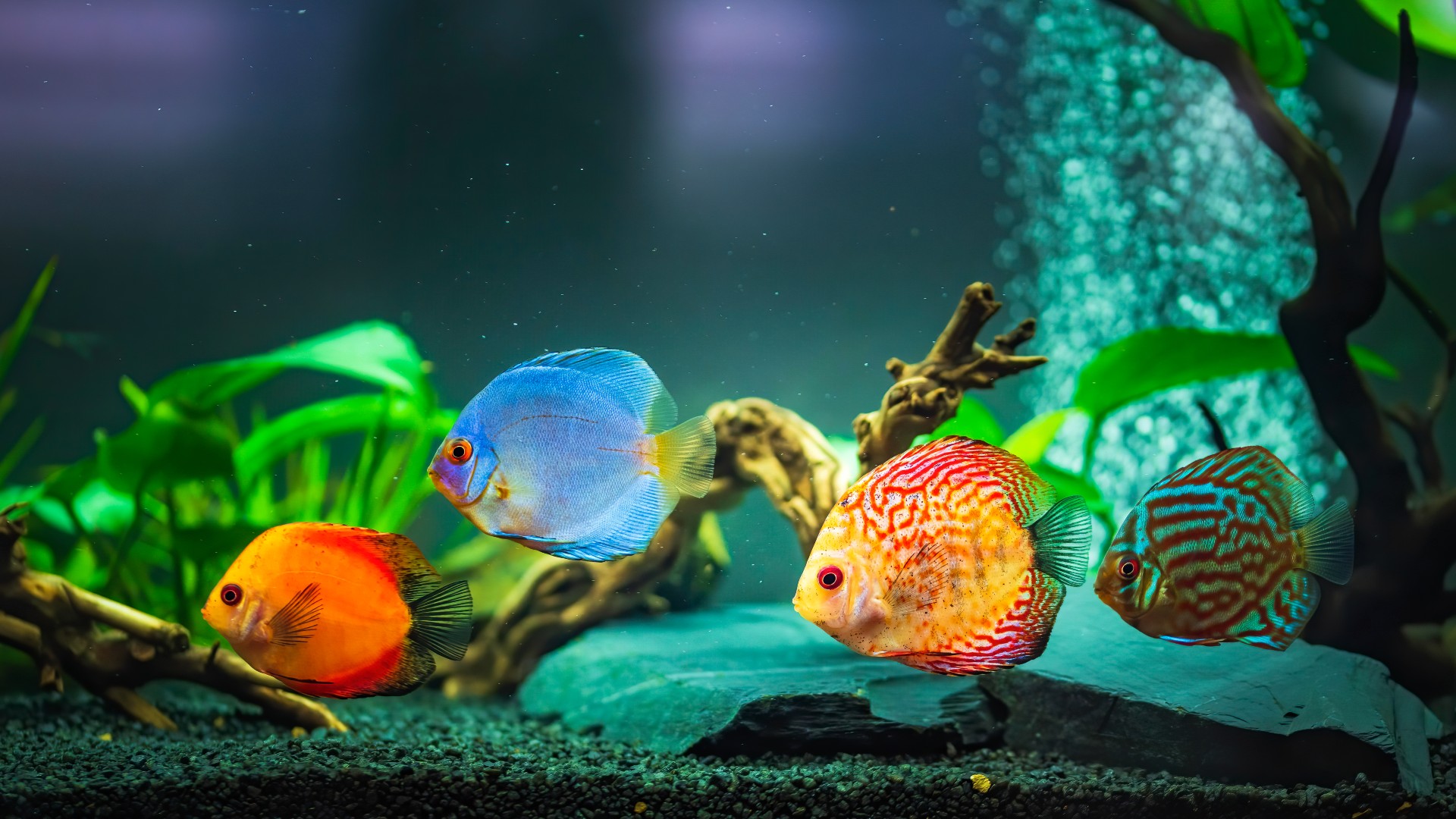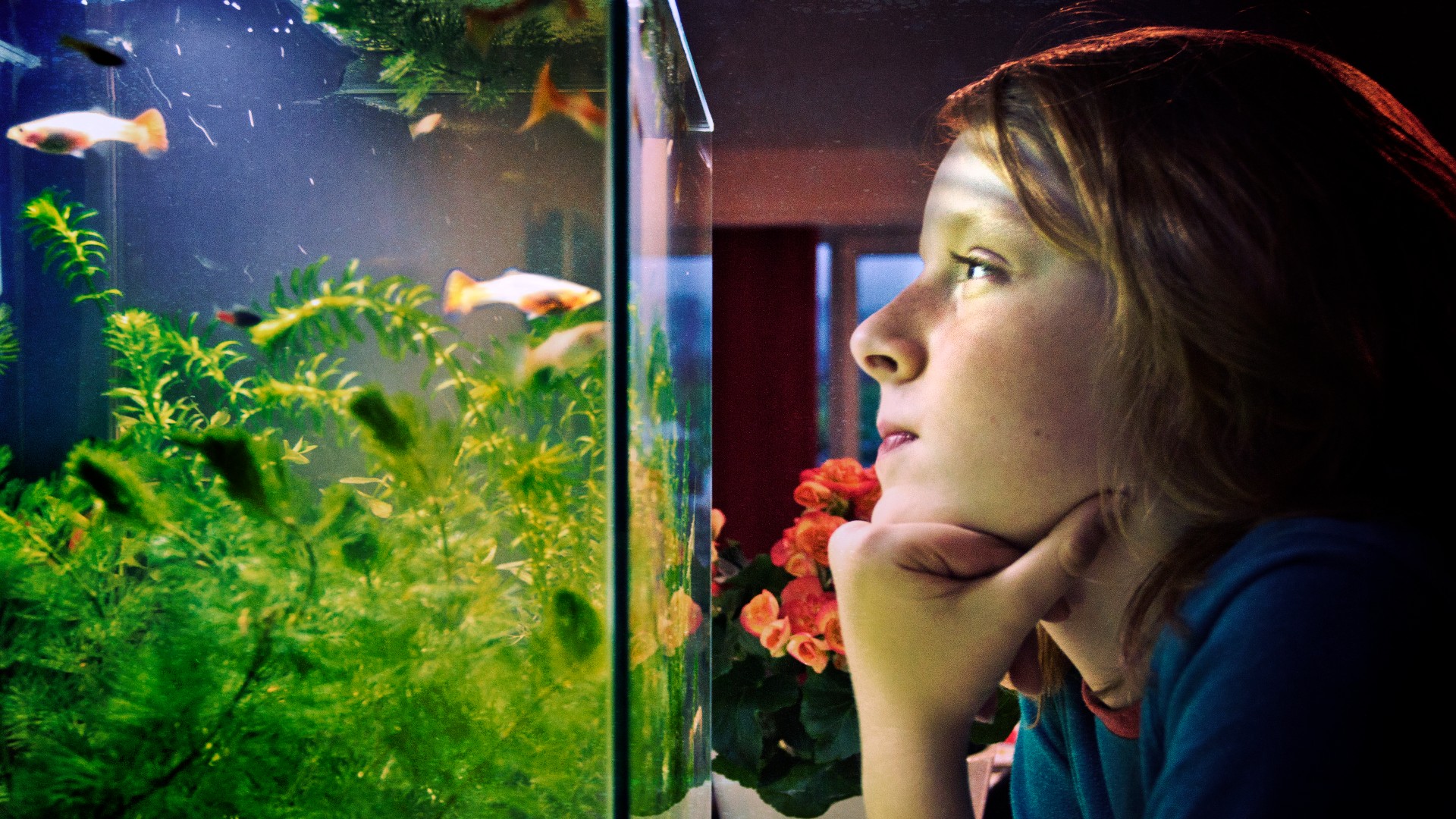Do fish get bored living in a tank? How to help fish boredom
Do fish get bored? We reveal the signs of boredom to be on the lookout for and share our tips to help ensure your fishy friends thrive in their tank

Get the best advice, tips and top tech for your beloved Pets
You are now subscribed
Your newsletter sign-up was successful
Do fish get bored living in a tank? While they’re not going to chew up your furniture or pee on your new rug any time soon, our finned friends suffer with boredom just like any other pet. Even if you’ve invested in the best fish tank that money can buy, if their habitat doesn’t provide them with enough stimulation and enrichment, your fish’s health and wellbeing could start to suffer.
Unlike our feline friends and canine companions, whose behavior is much easier to observe, there remains some debate in scientific circles as to the degree to which fish get bored and the signs to be on the lookout for. Swimming up and down a glass tank could, for example, signal boredom, but it could also be a stress response to overcrowding or a lack of socialization.
That said, what scientists are in agreement on is that the environment a fish lives in influences the development of its brain and the behavior it exhibits, with those reared in boring tanks that lack the best fish tank accessories for them to engage with having smaller brains and being slower to recover from stress. A good way to avoid this is to ensure the conditions in your fish’s tank are conducive to wellbeing.
In this guide, you’ll find everything you need to know to keep your relatively low-maintenance pet healthy and thriving, including the signs of boredom to be on the lookout for and various ways that you can ensure your finned friend gets all the mental and physical stimulation they need to live a long and happy life.
Do fish get bored?
While fish have historically been viewed as little more than something to be put on our plates and eaten, science is increasingly revealing these creatures to be highly intelligent, emotional beings who are capable of feeling pain and joy just as we humans are.
Just because fish have mask-like features that don’t reveal emotion in the same way that a dog or cat's features do, doesn’t necessarily mean there aren’t feelings going on beneath the surface as biologist Jonathan Balcombe explains:
“Their bodies are shaped differently, their eyes don’t blink, they’re bathed permanently in water and—while they make lots of sounds underwater—we don’t hear them because they’re transmitted in an aqueous environment,” Balcombe says. “But they are sentient creatures with the capacity to feel.”
Get the best advice, tips and top tech for your beloved Pets
Fish are quick learners with strong memories and have been shown to outperform primates on some tasks, so it’s not a leap to suggest that a highly intelligent creature like this would become bored when they’re living in an environment that doesn’t provide them with enough stimulating activities to keep their brains and bodies in tip-top condition.
Balcombe states that research findings show that aquarium fish seek out pleasurable experiences, such as riding bubble streams for fun, and live social lives that are very similar to the ones we humans lead, with social groups containing both friends and enemies.
Whether you’re looking for ways to care for a betta fish or trying to figure out how to make goldfish live longer, it's clear that one of the answers lies in making sure these smart creatures have the enrichment they need to both survive and thrive. But how can you tell if your fish is bored and even if they are, what can you do about it? Let’s find out.
How to tell if your fish is bored

One of the biggest challenges with fish is trying to distinguish between boredom and stress. Not only do many of the symptoms of boredom and stress overlap, they often operate in a bit of a vicious cycle, with one triggering the other. The good news is that many of the ways to help reduce stress in fish also help to reduce boredom and vice versa.
But, before we get into that, here are some key signs to be on the lookout for that may indicate your fish has a case of the boredom blues:
- A lack of activity - you’ve probably noticed that your fishy friends like to keep pretty active and most likely spend the majority of their time swimming around, exploring their environment and interacting with their fellow water-based buddies. Unless you have a breed of fish that is naturally more on the passive side, standing still for long periods of time in one place or hiding are both signs of boredom.
- Changes in behavior - be on the lookout for lethargy, fast frantic swimming, a refusal to interact with other fish, plunging into the sediment at the bottom of the tank and floating at the top of the tank when they’d normally hang out on the tank floor (or vice versa) could indicate boredom.
- Glass surfing - this behavior, which is when your fish swims up and down the glass, is a classic sign of boredom, but can also indicate that your fish is feeling highly stressed either because the conditions of their tank are sub-optimal or because they’re not getting along with their tankmates.
4 ways to help fish boredom
While helping to banish the boredom experienced by our fishy friends isn't quite as straightforward as alleviating the boredom dogs and cats feel, there are a few things you can do to help make your fish feel happier as they swim through their days. Here are a few of our favorites:
1. Invest in the right tank
While they may look small to our eye, fish still need plenty of room to swim about in. Swimming round and round all day in a tiny glass fish bowl is enough to drive anyone bonkers, so make sure that you have a tank that’s big enough to hold your single fish or school of finned friends.
For example, if you just have the one fish and are planning on keeping it that way, then selecting from amongst the best small fish tanks would be the way to go. These are compact enough that they won’t take up much space in an apartment, dorm room or office but large enough that your fish will still have plenty of room.
On the other hand, if you’re planning on keeping a school of bright and colourful tropical fish, then you’ll want to invest in the best tropical fish tank to ensure all your fishy friends have plenty of space to spread out in. To be honest, no matter whether you have one fish or 100, the bigger you can go the better, so try to steer clear of anything under five-gallons.
2. Make sure you have plenty of fish tank accessories
We can’t stress enough how important it is to your fish’s wellbeing that you kit out their tank with a good range of accessories. Functional decorations are vital as they provide your fish with places to explore and hide out in, not to mention the fact that they’re highly stimulating, which helps to reduce boredom.
Alongside functional decorations that your fish can swim through and hide in, you’ll want to make sure their tank has plants of different sizes (again, these provide great coverage when they’re looking to hide), stones and wood, and sand for your fish to dig and forage around in.
3. Provide them with the right company
We’ve all sat next to that person at a party who has bored us senseless the entire evening and believe it or not, our fish need to hang out with the right crowd too if they’re to stay happy and healthy. As mentioned earlier, make sure you have the correct size tank to comfortably accommodate your crew and do your research before buying fish so that you know which breeds can cohabitate peacefully.
You also want to ensure that you have the appropriate male-to-female ratio, as while most female fish of the same species will live together quite happily, male fish are notorious for fighting each other, so if you’re wanting to keep a mix of both, it’s best to have one male with two to three females. Exceptions to this would be some breeds, like the male betta, who prefer to live alone.
4. Spend time with your fish
Yes, granted, you can’t exactly jump in the tank and swim around with your fish in order to get that all-important quality time in, but if you have an interactive species (like the betta) then you’re going to want to put in an appearance beside their tank every day - after all, some fish are known for being able to recognize their owners and will perform certain behaviors or tricks for them.
Try and get creative when it comes to spending time with your fishy friends. Some have been known to respond really well to their owners doodling on the glass of their fish tank with washable markers because they find the colors stimulating. Other people have trained their fish to swim through hoops using the best fish food as a reward.

Kathryn is a freelance writer who has been a member of the PetsRadar family since it launched in 2020. Highly experienced in her field, she's driven by a desire to provide pet parents with accurate, timely, and informative content that enables them to provide their fur friends with everything they need to thrive.
Kathryn works closely with vets and trainers to ensure all articles offer the most up-to-date information across a range of pet-related fields, from insights into health and behavior issues to tips on products and training.
When she’s not busy crafting the perfect sentence for her features, buying guides and news pieces, she can be found hanging out with her family (which includes one super sassy cat and a kitten), drinking copious amounts of Jasmine tea and reading all the books.
She has written for a range of publications, including Fit&Well, Top Ten Reviews, LiveScience, Goodto, and Product Hunt.
